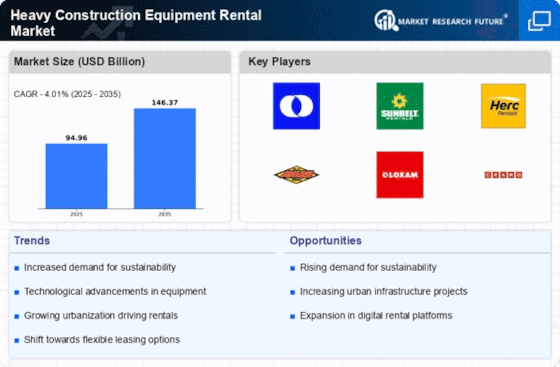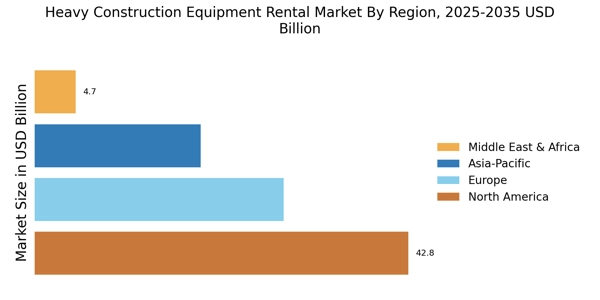Urbanization and Population Growth
Urbanization and population growth are pivotal factors influencing the Heavy Construction Equipment Rental Market. As urban areas expand, the demand for residential and commercial construction rises, necessitating the use of heavy construction equipment. Current estimates suggest that urban populations are expected to increase significantly, leading to a corresponding rise in construction activities. This trend compels construction firms to rent equipment to meet project demands without incurring the high costs of ownership. The Heavy Construction Equipment Rental Market stands to benefit from this dynamic, as more companies opt for rental solutions to accommodate the rapid pace of urban development.
Infrastructure Development Initiatives
The Heavy Construction Equipment Rental Market is experiencing a surge due to increased infrastructure development initiatives. Governments and private sectors are investing heavily in infrastructure projects, including roads, bridges, and public transportation systems. For instance, recent data indicates that infrastructure spending is projected to reach trillions of dollars over the next decade. This trend is likely to drive demand for heavy construction equipment rentals, as companies prefer renting over purchasing to manage costs effectively. The flexibility and reduced capital expenditure associated with rentals make it an attractive option for contractors engaged in large-scale projects. Consequently, the Heavy Construction Equipment Rental Market is poised for growth as these initiatives unfold.
Technological Advancements in Equipment
Technological advancements in heavy construction equipment are reshaping the Heavy Construction Equipment Rental Market. Innovations such as telematics, automation, and advanced safety features enhance equipment efficiency and safety, making rentals more appealing to contractors. Data indicates that the integration of technology in construction equipment can lead to productivity increases of up to 30%. As contractors seek to leverage these advancements without the burden of ownership, the demand for rental services is likely to rise. The Heavy Construction Equipment Rental Market is thus positioned to capitalize on these technological trends, providing access to state-of-the-art equipment that meets modern construction needs.
Cost Efficiency and Financial Flexibility
Cost efficiency and financial flexibility are critical drivers for the Heavy Construction Equipment Rental Market. Renting equipment allows construction firms to allocate capital more effectively, avoiding the substantial upfront costs associated with purchasing. This financial strategy is particularly advantageous for small to medium-sized enterprises that may lack the resources for outright purchases. Market data suggests that companies can save up to 50% on equipment costs by opting for rentals. As economic conditions fluctuate, the preference for rental solutions is likely to grow, reinforcing the Heavy Construction Equipment Rental Market's role as a vital resource for construction firms seeking to optimize their financial performance.
Environmental Regulations and Sustainability
Environmental regulations and sustainability concerns are increasingly influencing the Heavy Construction Equipment Rental Market. Stricter regulations regarding emissions and environmental impact compel construction companies to adopt more sustainable practices. Renting equipment that meets these regulations allows firms to reduce their carbon footprint without the long-term commitment of ownership. The market is witnessing a shift towards eco-friendly equipment options, which are often available through rental services. This trend not only aligns with regulatory requirements but also appeals to environmentally conscious clients. As sustainability becomes a priority, the Heavy Construction Equipment Rental Market is likely to expand, driven by the demand for compliant and efficient equipment solutions.

















